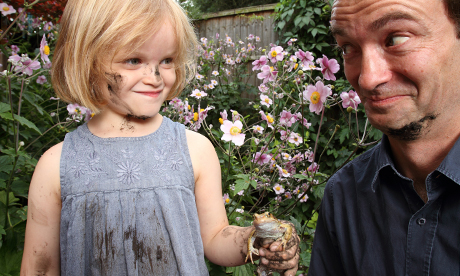Documentary Project Wild Thing claims kids need to get back to nature

Leaping forward: David Bond wants kids to embrace the natural world. Photograph: Project Wild Thing
The makers of a new feature-length documentary highlighting children’s estrangement from the natural world are encouraging schools to hold some classes in the open air to build a better relationship with the great outdoors.
David Bond and Ashley Jones conceived of the idea for Project Wild Thing around three years ago after both became fathers for the first time.
Their film, which was shot at locations in the borough including Hackney City Farm and was screened at the Hackney Picturehouse earlier this month, follows Bond on his mission to ‘market’ nature to his kids after he discovers that his five-year-old daughter Ivy spends just four per cent of her time outdoors.
“Across the western world children spend less and less time outdoors,” he states. “The generational shift to an indoor existence has been strongly linked to a sharp decline in children’s wellbeing. Cases of childhood obesity, depression and behavioural difficulties are at a record high… A recent UNICEF report found things are particularly bad in Britain.”
The film hit the big screen around the time of the release of environmentalist George Monbiot’s book Feral, which contains a chapter about children’s engagement (or lack of) with the natural world.
“Parents are wrongly terrified of strangers and rightly terrified of traffic,” writes Monbiot, who is interviewed by Bond in Project Wild Thing. “The ecosystem of the indoor world has become ever richer and more engaging. In some countries, children are now demonised and harried when they gather in public places; their games forbidden, their very presence perceived as a threat.”
As an antidote he recommends schools take pupils to “run wild in the woods” for one afternoon a week.
The lure of the virtual world and screen-based play has a lot to answer for when it comes to alienating children from the ‘real world’ of nature.
Computer-based learning is fundamentally different from the ways in which children learn by exploring the environment out of doors, according to Ashley Jones, who produced Project Wild Thing and lives in Hackney Wick.
“If you are indoors playing on a computer game that someone else has devised for you, you’re just following someone else’s path,” he says. “If you are outdoors and devising your own fun and looking at the world from your own point of view, all of a sudden your imagination opens up.”
But he says he is not anti-technology.
“I make films, so I don’t want to stop people from watching films on the big screen or on TV,” he says. “I do it a lot. It would be hypocritical if I said otherwise.”
He has sympathy with what he calls “a forest school ethos that believes you should not just have nature lessons outside, you should have maths outside”.
“Just being outside generally is better for children,” he adds. “Children who spend more time outside tend to be more connected with their environment, but they are also much calmer. The way that they learn is much more effective.”
But red tape can be an obstacle.
“Some of our research with schools revealed that a lot of the time health and safety is an issue,” says Jones. “A lot of the time teachers have so many forms to fill out before they can even leave a classroom.
“It makes life so difficult for people. A teacher might want to take kids out but it’s such a hassle that they just don’t.”
The film has already started a debate among educationalists though.
The Schools Network apparently wants a cut-down version of Project Wild Thing to be screened in schools.
The documentary also provided a springboard for the launch of The Wild Network – a movement championing outdoor play and education backed by organisations including the RSPB.
